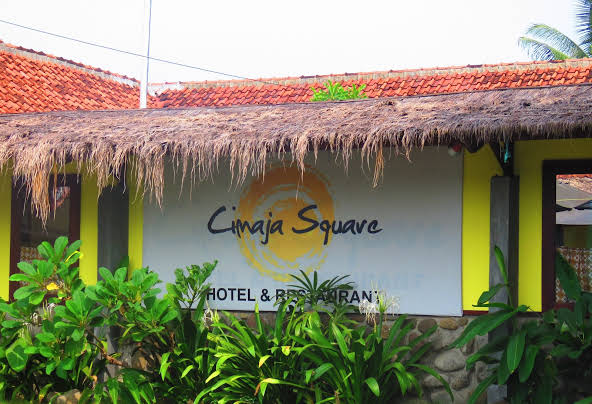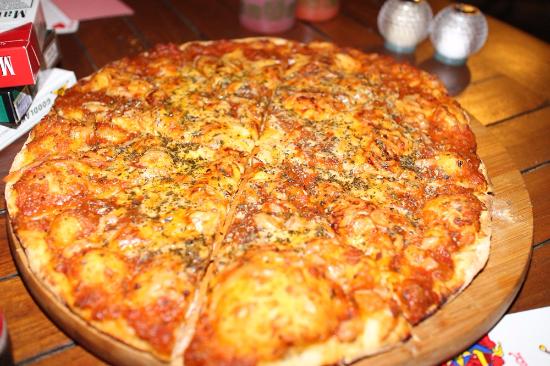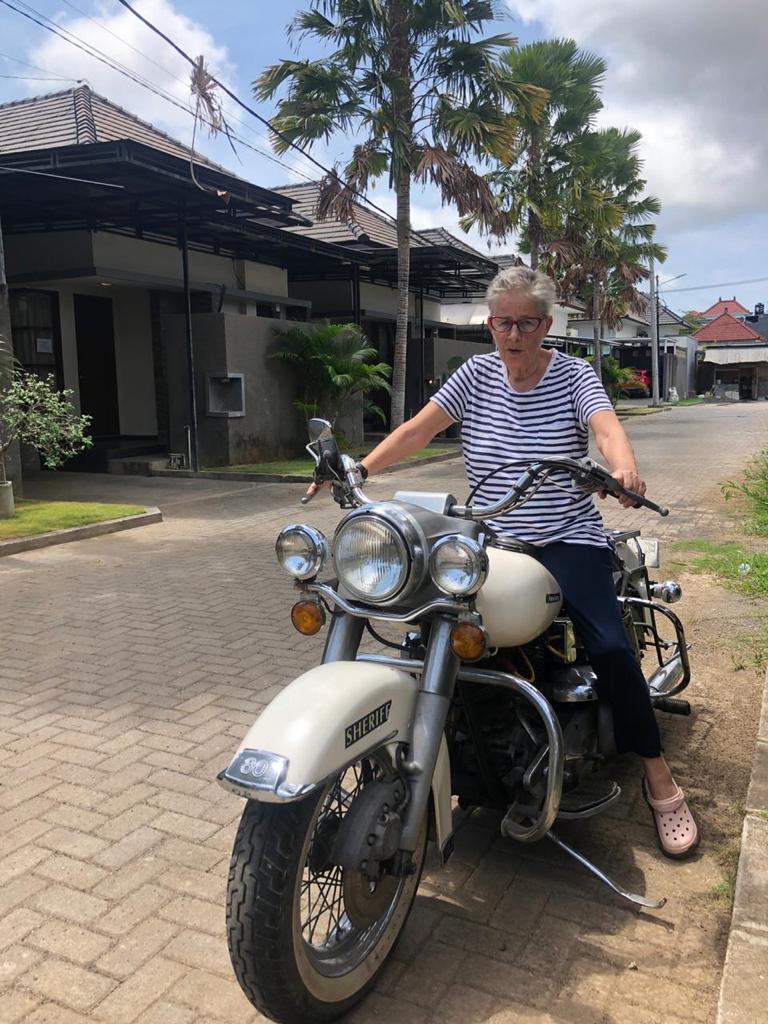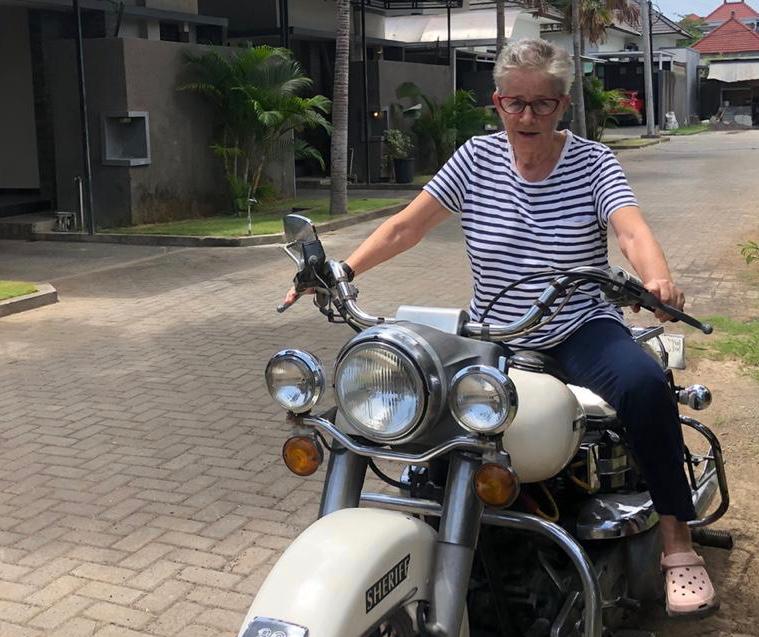Eleonora Detmers Lives the Pelabuhan Ratu Cowabunga
Eleonora Detmers, often called Nora, has never looked back since moving to Indonesia in 1976. Nora even admitted she’s not been homesick because to her, packing up her bags to go home would mean a period of unwilling adjustment to put herself through.
Born in the Netherlands to a Catholic family, Nora finished her studies at the Academy of Modern Arts, focussing on painting. Wishing to support her life completely and reflecting her strong characteristic of being an independent woman even until now, Nora gleefully started working at a travel agency in Amsterdam.
“I started learning the Indonesian language and knew a lot of Indonesian students because my boyfriend at the time was Indonesian. We got married and had our first son, Bucek Depp. After a while, my husband told me he wanted to move back to Indonesia; he believed his future was brighter at home,” Nora reflected.
Nora had visited Jakarta a couple of times prior to her family’s big move. She successfully ran her travel agency, Eurasia Wisata, until a year later when a series of policy steps in the economic sector known as KNOP-15 1978 hit, and resulted in major debts for her business. Despite having to sell it, Nora kept driving herself, working in major companies for many years in Jakarta. Then, she welcomed her second son, Fathir Muchtar.
“I found it more comfortable working in a big company than having my own company – fewer headaches,” she revealed.
She worked as the office manager at an international law consultant, then as the service manager at Citibank Indonesia and, finally, the service director. “I got very tired of it eventually, so I resigned without having a career plan B,” she said.
A job offer at a brand-new hotel in Pelabuhan Ratu emerged. Reluctant to accept and move there at first, “It was too good to say no to,” considering how she was only required to be there on the weekends and that her family could tag along.
“Pelabuhan Ratu is a very good place to spend your weekend; it’s not far from Jakarta. I was very impressed with my first visit to Pelabuhan Ratu in 1969. There’s a beautiful coast with multiple beaches and a mountain that’s very green, even during the dry season. I come from the Netherlands after all; I like seeing green meadows in front of me,” she said.
“In 1997, I started my endeavour in the hotel industry,” she recalled. Gaining sufficient hotel experience next led her to open her own hotel, Cimaja Square, 13 years ago. “I found a beautiful piece of land not on the beach, but in the middle of a rice paddy,” she noted.

She then went to the local mayor, expressing her desire to buy land to open a hotel. She bought it and fulfilled the mayor’s only wish: hire many Cimaja locals to work there.
Cimaja is a small village on the coast of Pelabuhan Ratu. It wasn’t too popular 15 years ago, but people started surfing and it became a surfing hotspot. Nora describes Pelabuhan Ratu as a world-class surf spot, attracting big-time surfer names from abroad. Even better, many beaches along the coast are perfect for swimming and other water sports activities.
As a down-to-earth hotel and restaurant equipped with a traditional design suitable to bat away fatigue on the weekends, she was inspired by her time in the Netherlands where people would gather at a “square”, an area where everybody meets each other.
Tripadvisor lists Cimaja Square as the number one restaurant and is said to have the best pizza in Pelabuhan Ratu. Nora said that probably 10 years ago, there was no other restaurant in the area, so it was easy to be number one. There aren’t many other contenders now, either.
No matter the rankings, Nora truly believes it depends on the guests’ preferences. The other option, as Nora explained, is more of a bar ideal for nightlife, whereas Cimaja Square isn’t – it’s a getaway to having a nice Western or Indonesian meal and to relax amid the captivating nature until 9pm. It’s one of the places for expats to find comfort with good meals and cold beers, superb after a long day of surfing.
“My market was 80 percent surfers, so they didn’t want to do anything else besides surfing. It’s an easy clientele. They want to have a good bed, a plate of food, and a good surf,” Nora explained. “I can recommend surfers spending two to three weeks to have a well-spent surfing escapade here. Weekenders are absolutely welcome too. Pelabuhan Ratu is a pleasant place to relax and be lazy while snacking and overlooking the rice paddy field.”
The expat life for Nora has been very comfortable; she tends to get special treatment wherever she goes. “I remember after I had my son in the Netherlands, my car broke down in a very cold, rainy, miserable area. Nobody stopped to help me. I had to wait for three hours for someone to help. But in Indonesia?” she chuckled, “Somebody comes and helps within five minutes. I’ve been travelling a lot and I’ve had many flat tyres – I never had to change a flat tyre once in Indonesia. I can still enjoy that today,” she said.
In 1982, Nora officially became an Indonesian citizen. The cool relations between authorities in her homeland and her new home had her thinking about her fate; Dutch citizens could possibly face hardships to the point of having to leave the country, a risk she tried to avoid. Becoming an Indonesian evidently brought convenience. She admitted she could work anywhere and didn’t have to deal with gruelling work visa issues.
“It’s a very free life here, I think life is easier, too. I can’t contemplate returning to the Netherlands anymore. My mother was still alive when my husband passed away. She asked, when are you going back? I was already in Pelabuhan Ratu and I told her, I have a beautiful view with sunshine greeting me every day,” she said.
Nora and her husband were married for 30 years. Unfortunately, he passed away 20 years ago. “I don’t consider having a mixed marriage as a hardship, but as a challenge, considering the cultural differences. It’s an interesting challenge. I was very lucky to have a very nice husband. He supported me throughout the years with my businesses, jobs, and answered my questions. I didn’t have Google at that time,” she said.
“Don’t control your husbands,”
Nora advises fellow mixed marriage couples. “I’ve always worked in the Netherlands and had my own money. With or without my husband, I must survive. Money was never really an issue, yet I see many failed marriages are caused by money. Don’t let money manage you, you manage your money.”
As for the conflicting regulations released by the government, Nora adamantly expressed that the law is the law, and everyone must accept it. One of Nora’s principles is: if one cannot honour the law of a country, then one isn’t supposed to be there.
“I didn’t have many problems with the Indonesian law, but I remember when I had to open my bank account back then, I needed my husband’s signature. I thought that’s my account, my money! But by law, I had to, and I obliged,” she said.
Nora spends most of her free time with her family. Her two sons grew up to be famous Indonesian film and soap-opera actors. “I didn’t really like it,” she revealed.
“As a mother, I support my children no matter the circumstances.”
Bucek got photo modelling jobs which he managed after school until, one day, he was invited to play a lead role in a major film called Pengantin Remaja, or Teenage Bride. “I said “no way!” But he’s my son, an independent guy. The art director came to our house, pleading to have Bucek part of the film and then started filming during his holiday. I couldn’t hold him back anymore,” Nora recalled.
In contrast, Fathir told himself for the longest time that he didn’t want to get involved in that industry because his private life would be thrown into the spotlight. That all changed when Fathir asked for further details from Bucek which upended his resistance. At 20, Bucek decided to pursue acting and dropped out of university, which Nora wasn’t too fond of. “He was very wise for his age though,” Nora said.
Surfing was one of the activities Nora indulged in, but she’s gotten older and doesn’t want to be surfing anymore. “I’ve had more than my fair share of surfing,” she commented. Nowadays, Nora usually spends her free time with friends or visits her sons in Bali and Jakarta.
What’s next for Nora and Cimaja Square?
She chuckled, “I told my staff two years ago that I’m getting too old to run this business day-to-day, please prepare yourself so that one day you can run it. They’re basically running it now, and I’m just around. I can go to Bali for one and half months, Jakarta for a couple of days, while the business is running. It’s perfect!” she concluded.
Reach out to Cimaja Square by calling (0266) 6440800, visit www.cimajasquare.com, or following Instagram @cimajasquare. Head on to Jl. Raya Cisolok No.KM.5, Cimaja, Cikakak, Sukabumi Regency, West Java 43365 to live Pelabuhan Ratu’s ultimate surfing cowabunga.




